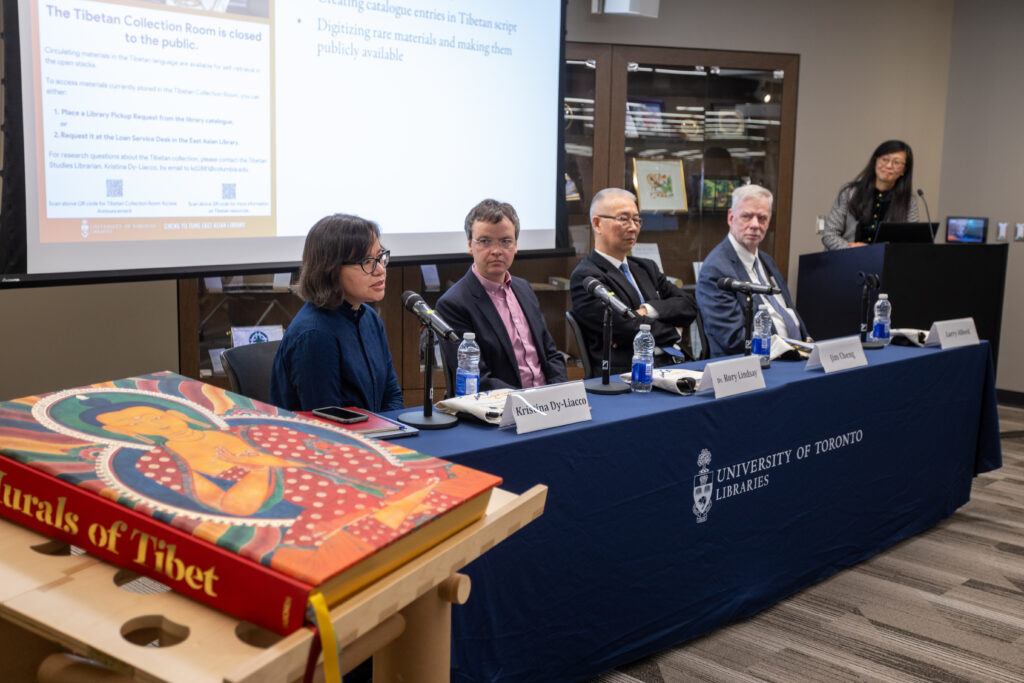Cross-Border Collaboration: A Decade of Advancing Tibetan Studies
Cross-Border Collaboration: A Decade of Advancing Tibetan Studies
Hana Kim
Have you ever wondered how institutions like libraries can work together to address historical disparities in academic fields like Tibetan Studies? Imagine a journey where two universities come together to enrich collections and foster interdisciplinary dialogue in a marginalized field.
In 2023, a significant milestone was celebrated as the University of Toronto Libraries and Columbia University Libraries marked a decade of partnership in Tibetan Studies collection development and services. This collaboration stemmed from a shared recognition of Tibetan Studies’ historical marginalization in North America, attributed to factors such as geopolitical complexities and the dominance of mainstream disciplines. Together, the two institutions embarked on a mission to address this disparity, striving to increase access to Tibetan resources and foster interdisciplinary dialogue among scholars on both sides of the border.

From left to right: Kristina Dy-Liacco, Rory Lindsay, Jim Cheng, Larry Alford, and Hana Kim
(Image credit: University of Toronto’s Cheng Yu Tung East Asian Library)
Join us as we explore the challenges, milestones, and transformative impact of this partnership in advancing Tibetan Studies collection development and services.
—the partnership between University of Toronto Libraries and Columbia University Libraries exemplifies the transformative potential of interdisciplinary collaboration in advancing cultural heritage and information science on an international scale—
Over the past decade, the collaborative efforts between the University of Toronto Libraries and Columbia University Libraries have overcome hurdles such as limited funding, language barriers, and political sensitivities to advance Tibetan Studies. Notably, the Tibetan collection at the University of Toronto’s East Asian Library has seen remarkable growth, expanding from 3,000 to nearly 9,000 items. This expansion has substantially improved access for scholars in both Canada and the United States.

(Image credit: University of Toronto’s Cheng Yu Tung East Asian Library)
The partnership includes collection development, joint acquisition trips, streamlined cataloguing processes through contract cataloger services, and improved research consultations. Through these endeavors, the partnership has enriched the Tibetan collections at both institutions, spanning a diverse array of materials such as books, manuscripts, maps, films, sound recordings, and electronic resources. Thanks to the coordinated cataloging and metadata creation process, these resources are now easily accessible. Moreover, the partnership facilitated the establishment of the first permanent Tibetan Studies Librarian position in North America, representing the only full-time librarian position among academic libraries in the region.
While significant progress has been made, several challenges have emerged in carrying out the partnership. The limited time allocation for the Tibetan Studies Librarian for the University of Toronto Libraries’ collection and services, as outlined in the current agreement terms, poses a challenge, particularly considering the increasing demands from the University of Toronto community. In addition, logistical constraints, such as the Tibetan Studies Librarian primarily working from Columbia University in New York and handling University of Toronto Libraries-related tasks remotely, create practical difficulties in acquisitions, cataloging, and donor relations. Ensuring cataloging quality and effective supervision of collection management require diligent communication and coordination between the off-site librarian and the head of University of Toronto’s East Asian Library department.
Furthermore, while opportunities for collaboration with the University of Toronto’s scholarly community in Tibetan Studies are expanding, such as onsite teaching support and community engagement, resource limitations and logistical challenges impede the realization of new plans or projects. Building unique and distinctive collections also necessitates dedicated onsite language and subject expertise.
Looking ahead to the next partnership agreement renewal in 2026, it is essential for both University of Toronto Libraries and Columbia University Libraries to start reassessing and adapting their collaborative strategies now for long-term sustainability and effectiveness. This proactive approach might involve considering options such as increasing the time allocation for the Tibetan Studies Librarian’s University of Toronto work assignment. Furthermore, exploring alternative support structures, such as reallocating existing resources and allocating additional funding, could ease strain on the partnership arrangement and the department handling it, while also boosting the partnership’s ability to meet the evolving needs of the academic community at the University of Toronto. Ultimately, our main goal is to ensure adequate library services and support for the university’s research, teaching, and learning endeavors. To progress toward this goal, it is crucial to thoroughly understand where institutional systemic structures may fall short. This understanding is vital for advocating and fostering support for such a marginalized field in a constructive manner.
In conclusion, the partnership between University of Toronto Libraries and Columbia University Libraries exemplifies the transformative potential of interdisciplinary collaboration in advancing cultural heritage and information science on an international scale. Inspired by initiatives like the 2CUL project, established in 2009—a radical collaboration between Columbia University Libraries and Cornell University Library— University of Toronto Libraries and Columbia University Libraries have demonstrated the power of cross-institutional cooperation in driving innovation and excellence in Tibetan Studies collection development and services. By leveraging existing expertise and resources, University of Toronto Libraries and Columbia University Libraries overcame barriers and achieved remarkable progress. As they navigate challenges and continue to innovate, University of Toronto Libraries and Columbia University Libraries will undoubtedly inspire a collaborative spirit and further solidify their leadership in Tibetan Studies in North America.
Cite this article in APA as: Kim, H. Cross-Border collaboration: A decade of advancing Tibetan studies. (2024, March 12). Information Matters, Vol. 4, Issue 3. https://informationmatters.org/2024/03/cross-border-collaboration-a-decade-of-advancing-tibetan-studies/
Author
-
Hana Kim is the Director of the Cheng Yu Tung East Asian Library at the University of Toronto. She holds a Bachelor of Education from the Korean National University of Education and a Master’s in Library and Information Science from McGill University. Hana has published and presented on a wide range of topics, including Asian Canadian heritage, diversity, and East Asian Studies librarianship. In 2009, she launched a nationwide Korean Canadian Heritage Archives Project for Canada, in collaboration with the University of British Columbia (UBC). She is the recipient of the 2018 Korean Canadian Heritage Award and served as President of the Council on East Asian Libraries (CEAL) from 2020 to 2022. Hana participates in several international organizations such as the CEAL Executive Board, Pacific Rim Research Libraries Alliance Steering Committee, Association of Research Libraries Kaleidoscope Program Task Force, and portal: Libraries and the Academy Editorial Board. She also served as the Head Librarian of the Asian Library at UBC before joining the University of Toronto Libraries.
View all posts





